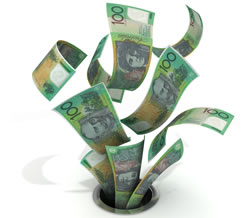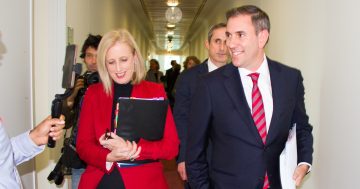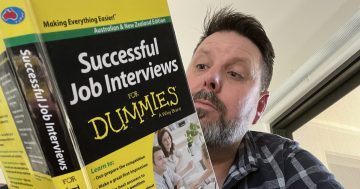Rebecca Blanc* says it is possible to overcome bad practices that make our relationship with money unhealthy and detrimental to our wellbeing.

Image: alexsl
You don’t have to be a financial expert to know the basics of budgeting.
There are plenty of tips that help people improve their saving and spending.
We’re taught to prioritise our spending categories so our phone service doesn’t cut off “randomly” and keep track of where our money is going.
These budgeting dogmas seem simple enough to incorporate into our lifestyles, but it’s often not so easy.
Budgeting is an extreme struggle of mine.
As I reflect on my journey to financial literacy, it’s clear I constantly avoided money-savvy tactics that would’ve helped me form a healthier relationship with money.
But not only did I ignore tonnes of money advice, I also created toxic practices that I’m still curbing today.
What is ‘money disorder’?
I’ve made so many transactions purely out of wilful irresponsibility, but I simply couldn’t help it.
I know my depression and anxiety correlates to my cyclic misuse of funds, but now there are actual studies regarding a specific disorder associated with money.
Money disorder, or financial anxiety, has yet to be recognised as an official diagnosis — but so much research, therapy and advocacy has been brought to this condition.
People can develop a money disorder when they have bad money practices that ultimately make their relationship to money unhealthy and detrimental to sustaining themselves.
I’d just assumed I was a reckless spender, but my behaviour was indicative of much more.
It’s encouraging to know I’m not alone, and that experts are doing the work to bring light to this issue.
Between formal and informal money disorder diagnosis, people with troubling financial history may realise their mental health played a factor.
Here are five tips I’ve attempted and failed miserably because of my struggle with money disorder.
- Act your wage
We all fantasise about our dream life.
My dream life involves making any purchase I want, whenever I want.
Perhaps my wish is actually compulsive expenditure, which is defined by Silverman + Associates as the urge to spend your money in order to “feel good.”
My dream world seeped into my financial reality; I would make large random purchases on impulse.
Now, these purchases did feel good, but shame and anxiety soon followed.
I kept putting my necessary expenses at risk, and I’d regret buying all these unnecessary items.
I noticed the pattern within each pay period and realised I wasn’t handling my money properly.
This cyclic behaviour was jeopardising my chances of financial wellbeing.
I finally stopped this behaviour, and I now appreciate the value of window shopping.
I’ve also realised planned purchases are more exciting than buying things on the fly.
Believe it or not, it brings as much joy as it does peace of mind.
- Pay yourself first
Financial anxiety has a lot to do with how you view yourself.
Reflecting on how I spent money helped me realise I honestly didn’t think about myself — at all.
As soon I received money, I felt an urge to spend it.
Saving money wasn’t a part of my practice.
My lack of literal funds was indicative of not only my money disorder, but my lack of self-worth.
I’d squander money because I never felt worthy of keeping any for my future.
Much financial anxiety is tied to our psychological perspectives.
This painful but empowering truth allowed me to dig deep to find value in myself.
This is how so many of us fall into a paycheque-to-paycheque cycle, which we all know is a dangerous game to play.
So, if you have the urge to spend, contemplate: what is the root of this urge?
How do you view yourself?
Build up your self-love, and watch your savings follow suit.
- Track every expense
I’d get paid on a Friday and have my credit card declined by the Monday.
Swiping my card carelessly left me in the dark on what I purchased.
Instead of staying updated with my accounts, I avoided my balance to gain a false sense of security.
But I learned that keeping a record of my expenses should not be a traumatic experience, and with better money attitudes, I now look at my finances frequently.
It’s best to stay informed.
Checking your expenses also saves you from unauthorised charges.
Even if it’s a small amount, track your money and protect your funds.
- Budget to zero
Does every dollar really need to be accounted for?
If I’m paying the essentials, can’t I just use the remainder on whatever I want?
No!
Financial anxiety makes it tougher to sit down and thoroughly create a budget for every dollar, but a detailed budget ensures you have an accurate and reliable view of your money.
Look at your finances in their entirety so you can be secure in your spending.
- Give yourself grace
My financial history led me to believe I wasn’t worthy of grace.
I made so many major mistakes, I felt like a lost cause when it came to budgeting.
But through understanding my condition and taking control over my finances, I can now be gracious with myself.
I no longer think about money from a place of anxiety and fear.
I now approach my expenses in a positive and proactive manner.
Money is a complicated area for many, and there is hope for everyone to improve their financial literacy.
Instead of swiping blindly on payday, I check my balances multiple times a week.
I’m sure to pay my major bills first.
Shopping trips are now executed with emphasis on quality over quantity.
And I actually have savings!
It’s protected with my life, because I finally see that I’m worth it.
* Rebecca Blanc is a copywriter.
This article first appeared at thefinancialdiet.com.











